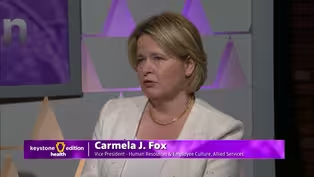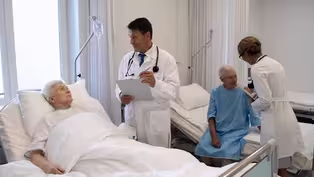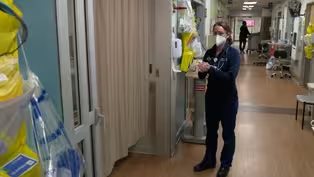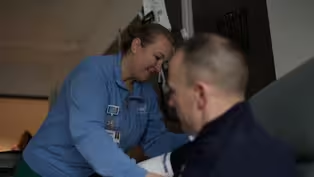Keystone Edition
Education and Local Solutions
Clip: 1/20/2025 | 7m 17sVideo has Closed Captions
Programs engage high school students through career fairs, clinical roles, and scholarships,
Programs engage high school students through career fairs, clinical roles, and scholarships, while non-traditional students benefit from flexible class options and mentorship, ensuring a robust pipeline of skilled professionals.
Problems playing video? | Closed Captioning Feedback
Problems playing video? | Closed Captioning Feedback
Keystone Edition is a local public television program presented by WVIA
Keystone Edition
Education and Local Solutions
Clip: 1/20/2025 | 7m 17sVideo has Closed Captions
Programs engage high school students through career fairs, clinical roles, and scholarships, while non-traditional students benefit from flexible class options and mentorship, ensuring a robust pipeline of skilled professionals.
Problems playing video? | Closed Captioning Feedback
How to Watch Keystone Edition
Keystone Edition is available to stream on pbs.org and the free PBS App, available on iPhone, Apple TV, Android TV, Android smartphones, Amazon Fire TV, Amazon Fire Tablet, Roku, Samsung Smart TV, and Vizio.
Providing Support for PBS.org
Learn Moreabout PBS online sponsorship- Thank you.
- Well, obviously, this is a topic that we hear about pretty often.
I feel like we've even touched on it a little bit on this show.
But it seems to be a problem that just continues as opposed to abating.
So, hopefully you'll have some good news for us tonight.
Carmela, I'd like you to talk a little bit about your role at Allied Services.
I love that your title also has Culture in it.
Can you tell us why that is?
- Yes, thank you very much, first of all, for letting us join you tonight.
And we just created this role, Employee Culture, to try to create an attractive workforce where people feel good about coming to work each day.
We've always done that, but just not formally.
And putting that formal plan into place, we are throughout 55 locations throughout Northeast and Central Pennsylvania.
So, we need a formal plan to make sure that wherever you go within the Allied system, that you feel that same welcoming experience as an employee that our patients and residents feel when they visit our system.
- Don, you also spoke a little bit about culture when we talked this week.
Can you talk about how you're developing your culture as well?
- You know, culture is something we've developed over many years, and it is something that has helped us with retention, recruitment, and intention.
We do regular employee engagement surveys and we score in the top decile.
And when you talk about shortages, one of the most important things is retention.
So, as you recruit individuals, you wanna retain them also.
And so, we feel that our culture's a big piece of our recruitment strategy that we have.
More and more applicants are asking about work environment and culture.
- Yeah, it does seem to be something that people talk about regularly.
I think about 10 years ago probably wasn't as prominent a thing that people looked for at work.
I know that The Institute has done some research around healthcare shortages here in this area.
What sorts of things did they see?
And was culture per chance one of the things that people were looking for?
- Culture is very important, especially considering the rising rates of burnout, difficulty depending on the occupation.
There is some difficulty when we think about wages and reimbursement rates for certain healthcare workers.
They don't always get the livable type of income that they need.
And so, in order to keep them in place and to help retain them, it's really important to make sure that they're satisfied and that they're rewarded and valued in other ways as well.
- Yeah, I'm glad you brought up burnout actually, because we know that physicians face a lot of burnout.
So do nurses.
Clearly, COVID did not help the situation.
Don, are there any programs that you have in place at St. Luke's that helps with burnout?
- Yeah, we have a lot of things that we do around supporting our staff.
You know, certainly during COVID, we had to really increase that in the patient care setting.
Whether it was safe spaces people could go to and just take a break.
Or having somebody that they could talk to.
But yes, both on the physician side and the employee side, we do have a lot of support for our team members.
And you know, I think actually having good staffing is a good piece of that 'cause you talk about burnout and that, and I know we're gonna talk more about it, but we've made a lot of strides in that as well.
But yes, we give a lot of thought to how we can support our team members.
On our campus, we have a walking trail.
And so, we see a lot of people when the weather's nice, just getting out and taking a walk outside on their breaks and stuff.
- That's lovely.
Let's go back a little.
Let's talk about entry level healthcare professionals because I know that's a very different thing that's happening for them than for physicians or specialty physicians.
Can you tell us a little bit about how you're supporting entry level healthcare professionals and what some of their special needs are?
- The biggest thing that we do is try to change the dynamic from a job to more of a career.
And even though you're coming in entry level, we try to provide a lot of opportunity within our system for people to advance their career and develop a path.
So, it gives 'em a goal to work towards.
So for example, we have partnerships in place with Lackawanna College and they can get free tuition working at Allied Services while going to school, and we flex the schedules for them to help accommodate them to attend school.
And it's fully funded so it gives 'em a path.
We have 2,700 employees within our system, several hundred jobs.
So, there is a path for most people if they wanna stay within the system.
We also partnership with career technology in Lackawanna County for our Licensed Practical Nurse Program.
And we have partnerships, a new partnership actually we're excited about with University of Scranton for graduate programs for reduced tuition.
So those partnerships are a great value to us and we use that to help support our staff and give 'em a path.
We also fund Student Loan Repayment Programs and tuition assistance, so there's opportunities.
And even if somebody doesn't want an opportunity, we still wanna make it a great place to work and a welcoming environment.
Some people they maybe don't wanna have that career path, that's fine.
We have opportunities in those entry level positions like food service workers and direct care support professionals that maybe don't wanna go on, but those are such valued positions as well.
So, if people have a compassion for doing that type of work, that opportunity is very fulfilling.
- Don, I know you have some similar programs and you might even have some stories about people who have gone through these programs.
- Yeah.
- Can you share those, please?
- Yeah, very much like Allied is doing, we have a lot of programs to support our workforce, and it also benefits us as an organization because many of those folks grow into roles that we have needs, nursing as an example.
And when you and I were speaking, I talked about, you know, even like in our, a lot of our entry service level jobs, nutrition and those, we have employees who take advantage of the opportunities we have to go to nursing school.
And I think I was sharing with you, we had one employee who, young man outta high school and he was thinking about nursing, but we had this opportunity for on-the-job-training to become a sleep lab tech.
And he took advantage of that and he's almost done with his training and he'll be a certified sleep tech performing studies for us.
And so, and there's, we have like many organizations, we have many positive stories of employees who have come to us and taken advantage of the opportunities that we've presented for them, and it's really rewarding when you see that happening.
- Jill at The Institute, how are you all working with the community in healthcare systems to address the shortage and come up with solutions?
- Well, we are very much behind the scenes.
We are not healthcare practitioners by any means, but we are available to provide data analytics, community-based research services.
So for example, that might look like a community health needs assessment for a healthcare provider where we can help them identify gaps within their communities where there's particular need or high priority.
We can also help them identify strengths that they can capitalize on.
We also have a health and healthcare task force, which is comprised of some volunteer subject matter experts who help us identify study areas.
And we produce research annually, a cycle each year.
This year we are looking at the pipeline for mental healthcare and behavioral healthcare workers.
We also, actually many of our organizations in the community are fortunate enough to be working with the Philadelphia Federal Reserve Bank right now as well for their Anchors For Equity Initiative.
The result of that will be an an equitable workforce development pipeline within the anchor institutions in the region.
And those anchor institutions are education and healthcare.
So, there's a lot of good move forward momentum.
- Right, and when do we expect that the behavioral health report will be out?
- That will be out in May.
- Okay.
- Yep.
- Well, I guess, we'll look forward to that.
- Stay tuned.
- I know that there's been a shortage there too.
- Yes.
- So hopefully, we will have seen some improvement.
And actually, that's something I'd like to hear from any of you that would like to respond.
Have we seen improvement in the shortage?
I would still like to talk more about what you're doing, but do you see these things working?
Would you like to?
- Yeah, I would certainly comment that the answer is yes.
We've seen a lot of improvements.
You know, during COVID, I think, a lot of us were challenged with staffing for various reasons, but there has been a significant improvement in our recruitment and retention, and our reliance on things like agency or, you know?
And so, yes, absolutely.
There's been a significant improvement.
A lot of the initiatives that we've implemented are working for us.
- And I know that you also have an Employee Growth Program.
Can you talk a little bit about that too?
- Yeah, we have a career website for our employees that they can go to and a lot of it's self-guided, but it provides them with assessments and mentorship and helps them write a resume.
So, when they're interviewing for jobs within our network, they have a good resume, there's different modules they can take.
And so, some of these students wanna go on and go to college and advance, but not all of them.
Some of them, they just wanna develop their skills and become better at what they do.
Whether it's a position that requires an education or not, it just helps them be better at what they do and provides some of that fulfillment and development.
And so, it's a really neat tool that we have for them.
- And you spoke a little bit about this too, right?
That folks may not necessarily want to go up the ladder, but how do we keep them feeling comfortable where they are?
And I think a lot of times there's certain hurdles that people have that oftentimes reflect social determinants of health, for instance.
What types of programs are you providing to help with those types of curves?
- So yes, we definitely wanna make sure that people do have access to resources.
So, we do provide resource lists.
We provide career counseling, we provide all kinds of community resource connections for people.
If we have employees who are experiencing hardships, we work with them to try to overcome what's going on in their life on an individual case by case basis 'cause it does exist.
And it does become a challenge, you know?
Things like daycare and figuring out how to even get to work and the bus schedule, for some of our workers poses real challenges.
So, we do work with them to try to find opportunities, to work on finding ride sharing opportunities.
But yes, definitely a challenge.
And I agree, we've had more success in the last year or two with our recruitment numbers have gone up, but they're not where we need them to be to be able to increase our census in our facilities.
I mean, the end result is that when you don't have enough staff, you gotta stop taking admissions based on your staffing and your staffing ratio.
So, it does limit the resources to the community.
Why this is such an important topic to try to attract more people into this occupation.
If it's something you have a passion for, we try to limit the financial deterrence from somebody advancing their education.
And a lot of people still go the traditional route through college, but if you get into a system and you work your way up, some of our best nurses, for example, are those who started as a certified nurse aide and they know what those people are dealing with.
So when they work together as a team, they're not coming in straight outta school into a registered nurse position without having that background and that knowledge.
So, I think it helps the whole environment when you have those ladders in your own organization.
So, that's been a real resource for us.
- Yeah, I read a statistic that said that there are nursing, people who are interested in nursing who are qualified students who can't even go to school because there's not enough people to teach in the schools either, which just sounds mind-boggling to me.
- It is a limiting factor when you talk to educators.
There's two limiting factors.
One is faculty.
And so, having enough faculty to teach, and then also do the clinicals in the hospitals.
I know we try to work with some of our nurses to provide them the opportunity to both do bedside but also do clinical instruction 'cause it benefits us as well.
So that's a big challenge for them.
And then, finding enough clinical sites sometimes for them is difficult as well, you know?
So, they're not always constrained by their own constraints, but by where they can place students for clinical rotations.
- Yeah, let's talk a little bit about education actually.
Do you believe that the med school being here has helped the healthcare shortage?
I mean, I know there's a lot of people that come from outside the area.
Of course, there's local students, but we have a problem getting people to come back after residency.
What have you seen at The Institute trend-wise?
- The medical school is very helpful.
I think actually though from a broader perspective, we have such a robust network of educational institutions and the medical school is absolutely one of them.
We also have residency programs and nursing and pharmacy, and OT and PT, and all of these other wonderful programs.
There's plenty of learning to be had.
So, that's absolutely an asset.
Building Careers and Breaking Barriers
Video has Closed Captions
Clip: 1/20/2025 | 14m | Experts suggest solutions to the healthcare workforce shortage, highlighting strategies (14m)
Health Workforce Shortage - Overview
Clip: 1/20/2025 | 1m 11s | Health Workforce Shortage - Overview (1m 11s)
Health Workforce Shortage - Preview
Preview: 1/20/2025 | 30s | Watch Monday, January 20th at 7pm on WVIA TV (30s)
St. Luke's Tackles Healthcare Worker Shortage
Clip: 1/20/2025 | 1m 59s | St. Luke's President Don Seiple discusses the healthcare worker shortage, (1m 59s)
Providing Support for PBS.org
Learn Moreabout PBS online sponsorship
- News and Public Affairs

Top journalists deliver compelling original analysis of the hour's headlines.

- News and Public Affairs

FRONTLINE is investigative journalism that questions, explains and changes our world.












Support for PBS provided by:
Keystone Edition is a local public television program presented by WVIA



